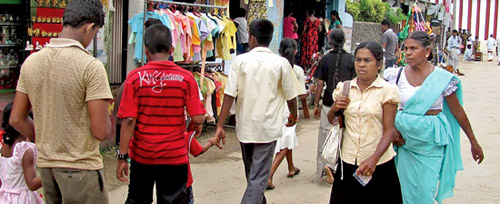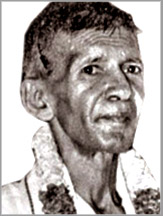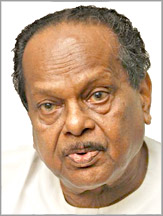The opposition engagement in political alchemy needs to end
 Dr Kamal Wickremasinghe Dr Kamal Wickremasinghe
The desperation of the parliamentary and extra-parliamentary
opposition to the Sri Lankan government became apparent when they blamed
the inundation of some Colombo streets during recent heavy rains on the
government’s urban development programme. This particular attempt to
find faults with one of the most popular initiatives of the government
is clearly the nadir in their search for “issues” to jump on.

Such ridiculously desperate tactics of almost comical proportions are
a sign of the total and obvious failure of opposition groups ranging
from the UNP to Sarath Fonseka to garner significant mainstream public
support - Sri Lankans are not falling to their vacuous “decline of
democracy” war cry scripted by the US and the EC.
They simply lack leadership and any constructive policies to address
any cost of living issues arising from international conditions and the
particular transformative economic development process the country is
undergoing after the end of 30 years of war. The people are simply not
going to hand over power to a dead UNP or a desperate JVP, risking a
de-facto rule of NGO-wallahs serving foreign interests.

The vacuum created by a disturbingly ineffectual “legitimate”
political opposition however, complicates the exercise of democracy, as
the government is trying to do through the Northern Provincial Council
elections in September. The elections in such a political atmosphere
pose the real risk of inviting the regressive, ethnically-based and
divisive groups to the fore.
Such an eventuality can only be prevented by the opposition groups
acting responsibly - they need to recognise the basic fact that the
Northern Provincial Council election prescription was, and remains a
“non-solution” to any ethnic “problem” Sri Lanka is facing - it was a
“solution” devised, back in 1987, by an India at the end of its tether,
as well as that of the Tiger it created to avenge J.R. Jayewardene, and
undemocratically imposed on Sri Lanka.
The LTTE reactions after the introduction of Section 13 Amendments
including the murder of Rajiv Gandhi, and the intense dissatisfaction
among the majority population in the country, would have shown all the
subsequent Congress and BJP governments of India that their prescription
was never going to ease the pain of Sri Lanka.

Rajiv Gandhi |

M.A. Sumanthiran |

C.V. Vigneswaran |

S.J.V. Chelvanayakam |

V. Anandasangaree |
Mature professional diplomacy in an atmosphere of goodwill and
genuine commitment by the government to find non-ethnically based
solutions to address minority grievances should enable Sri Lanka to
revisit the entire issue afresh with India. The opposition needs to
support the government in the national interest, rising above party
politics. The wishes of the “international community” of US and EC
neocons who saw an “opportunity” for territorial disintegration of Sri
Lanka by creating the momentum, firstly for holding Provincial Council
elections as a “solution”, and then as a measure of reconciliation with
the Tamil minority, will need to be set aside as inimical to national
interest.
The five-member rag tag group masquerading as the Tamil national
Alliance (TNA), also known as the “Tiger Nominated Agents”
A cursory look at the forces that are likely to contest these
elections show the ugly possibility of it proving to be a platform for
the launch of 50:50 type demands initiated by selfish Tamil politicians
like S.J.V. Chelvanayakam and G. G. Ponnambalam.
The uttering of one of the potential “celebrity” candidates, the
retired judge C.V. Vigneswaran proves the point - he seems to have
nothing new to offer to the new nation emerging from a destructive war,
other than to dwell on past grievances involving alleged bad treatment.
A recent speech given by Vgneswaran, fittingly and notoriously tagged
the Thanthai Chelvanayagam Memorial Lecture, on the subject ‘Whither Sri
Lankan Tamils’ (why not ‘where’?) reveals as to what he has on offer for
the Tamils – more of the same views and positions that have landed them
at the current poor bargaining position!
Obviously motivated by the apparent need to promote the dignified
“legal luminary” status, Vigneswaran starts by pointing to the justice
system which he describes as going through the “most perilous” period in
Sri Lankan history! Then he points to the precarious position of the
Tamil speaking community, attempting to assert that the Tamils were
“never a minority”. Both views show that self-delusion is a real
possibility.
Justice (retd.) Vigneswaran’s historical grievances begin with the
alleged repudiation of a promise to Sir Ponnambalam Arunachalam by
“Sinhalese leaders” Sir James Peiris and E.J. Samarawickrama, 90 years
ago, to support the demand for a Tamil seat for Colombo, as per the 1921
Constitution drafted almost entirely by Sir P. Arunachalam. The good (retd.)
judge contradicts himself here trying to portray pure ethnically-based
discrimination, unless Sir P. Arunachalam had changed his ethnicity!
Such narrow-minded efforts to dwell on alleged past injustices,
forgetting that the other side also can level such allegations,
particularly of treachery by Tamils at times of foreign invasions, shows
that the need for a “fresh beginning” has not sunk-in yet in the minds
of those aspiring to fill the void of responsible, broad-minded Tamil
leadership.
The five-member rag tag group masquerading as the Tamil national
Alliance (TNA), also known as the “Tiger Nominated Agents”, comprising
Ilankai Thamil Arasu Katchi (ITAK) – a reincarnation of the Federal
Party, and former terrorist outfits Tamil Eelam Liberation Organisation
(TELO), Eelam Peoples Revolutionary Liberation Front (EPRLF), Tamil
United Liberation Front (TULF) and Peoples Liberation Organisation of
Tamil Eelam (PLOTE) is an unprincipled collective that still carry the
word “Eelam” and the LTTE symbol of the “rising sun” in their party
insignia. The TNA’s disgraceful history became worse when they
sacrificed the single decent human being they had within the
organisation, V. Anandasangaree, at the blood-dripping altar of the LTTE
to win the 2004 elections under LTTE patronage, becoming the official
LTTE representation in Colombo; The relief the Tamil people received
from the LTTE-TNA oppression as a result of the end of the war is often
overlooked in the US-driven hysteria over the so-called civilian deaths
at the final phase of the war.
TNA cynics like M.A. Sumanthiran who purports to represent the
Christian Tamils, but acting in the most uncharitable ways, and the
un-reformed Tiger K. (Suresh) Premachandran are showing their stripes,
trying to employ their divisive, militant and selfish tactics in
campaigning, with the hope of again arousing the Northern Province
Tamils who have suffered enough through such militaristic nonsense of
the past.
Premachandran is trying to take the TNA along a regressive militant
path by seemingly acting on the instructions of the extremist elements
of the diaspora. Despite being a minor player in the TNA collective, he
is leading a self-serving campaign to fight the September elections
under a “united” TNA banner that will help him hide, as well as make the
TNA the voice of the extremist diaspora formally.
Sumanthiran, with the help of the US-financed NGO, the so-called
National Peace Council, is trying to create an international emergency
over the legal acquisition of lands in the peninsula (under Section 2 of
the Land Acquisition Act) by the government for perfectly legal
legitimate civilian purposes of expanding the Palaly airport and the
Kankasanthurai harbour, after compensation (worth Rs. 400 million), as
an arbitrary “military” take-over of civilian lands.
Sumanthiran seems to be unaware of the fact that government’s right
to acquire land after due compensation is enshrined in the constitution
of countries like Australia and all the facts relating to the Sri Lankan
government action in this regard meets the gold-standard of rule of law
and human rights protection.
The broad-mindedness of the leader (of bad faith) of the so-called
National Peace Council who is accusing the government of conspiracy to
change the demographic composition in the north with settlers from
elsewhere, does not seem to be able to extend his benevolence to the
ethnically-cleansed Sinhalese from the North. Such people seem to be
simply unable to see things objectively!
In the meantime the UNP, ever the party to seek international
patronage, has entered the fray with a demand for the deployment of a
group of international and Commonwealth “election observers” from the
day the nominations are closed. The venerable leader of the UNP has also
demanded the removal of the present Northern Province governor because
he is a retired military officer.
The UNP-affiliated People’s Action for Free and Fair Elections (PAFFREL)
has already commenced programs, starting from Mannar district, to
increase public awareness. It can be safely assumed that the public are
unlikely to be made aware that PAFFREL is an outfit funded by the
anti-democracy CIA-front, the National Endowment for Democracy (NED) and
USAID. Probably the CID needs to inform PAFFREL of that!
Anti-government politics in Sri Lanka is rudderless
The pathetic state of the whole spectrum of anti-government movements
in Sri Lanka points to a deeper malaise that is inflicting them in terms
of the lack of a political doctrine, as well as judgement and strategy.
In the absence of a political philosophy or ideology that is appropriate
for the particular political, social and economic epoch Sri Lankans are
living through, they seemed to be adopting the neocon-preached
“pro-democracy activism” for the obvious financial lure that offers. The
worst aspect of this movement is their attempts to contrive “crises” of
democracy out of each of the government’s administrative actions.
The failed attempt to inflate the impeachment of the former chief
justice to a national crisis was a classic example where the opposition
attempted to portray the event as an attack on judicial independence by
pushing the actual allegations against her away from the limelight,
advising her not to appear before the Parliamentary Committee and then
complaining about the “lack of due process”. The Sri Lankan people
across the class spectrum refuse to be associated with such campaigns,
showing a sophisticated understanding of reality.
The opposition has also failed to address the problem of
ethnically-based political entities, as is apparent from their strategy
based on forming alliances among diverse groups organised along ethnic
lines.
Deeper problems lie in the mindset
In the final analysis, the ineffectiveness of the opposition
political parties and other groups in Sri Lanka boils down to the
theoretical and ideological framework within which they operate - they
are essentially prisoners of their social, and (Western) educational
background that appear to make them embrace uncritically neo-colonialist
agendas tailor-made for the developing world where tensions created by
social and economic inequality are abound.
One of the key issues is the Western, more particularly American,
inculcated tendency to view politics as a science rather than an “art”
form. America presents a type case where the Aristotelian view that
politics is the ‘master science’ that encompasses military science and
rhetoric is gravely misunderstood.
When Aristotle described ‘politics’ as politikê epistêmê or
‘political science’, he also distinguished it from the two main branches
of the ‘real’ sciences at his time, physics and metaphysics. He noted
that the “ends and objects” of politics are concerned with the noble
action or happiness of the citizens, unlike in science where the aim is
to improve knowledge and understanding derived through observation
against the background of theories and paradigms.
Aristotle’s Politics was translated in the 13th Century and became
the basic text in the works of Saint Thomas Aquinas who furthered
Aristotle’s dictum that basically, politics is part of man’s search for
happiness in a state of social harmony as a social animal. In keeping
with this tradition, the British academic and Liberal politician Lord
James Bryce compared Political Science to a relatively underdeveloped
and inexact natural science like meteorology.
Modern political science, as it is practiced in the US, seems to have
gone astray as regards to its objectives, with its focus shifted to the
“scientific” study politics, attempting to convert it to a quantitative,
psychological, and anthropological study of society, resorting to
multiple regression analysis as the sole legitimate tool of the trade.
As a result, American political science researchers seem to discover
fundamental, “universally valid”, eternal precepts of good governance
through the adoption of such techniques, but fail to conduct a decent
analysis of the forces and mechanisms that led to the neocon capture of
power in America in little over two decades.
What passes for political science in America today, and by extension
in western trained minds the world over is more the “politics model” of
political science established by Niccolò Machiavelli, which emphasises
the direct empirical observation of political institutions and actors as
a means necessary to create a “glorious regime”, without any qualms
about morality.
The opposition is unable to see the wood for the trees
It is a shocking indictment on the political sophistication of the
opposition in Sri Lanka that instead of questioning the value of the
proposed provincial council system as a solution to ethnic issues in Sri
Lanka, they are clamouring about foreign election monitors and how
Tamils were hard-done-by nearly a century ago. Idiomatically and
literally, they don’t seem to be able to see the wood for the trees.
Hiving out separate parcels of land they conquered for groups showing
difference in skin colour, language or ethnicity was essentially part of
the colonial divide-and-rule armoury, practiced venomously by Winston
Churchill in particular, at the sun set on the empire. Churchill sought
to deepen India’s inherent fissures between the Hindus and Muslims which
he regarded as “the bulwark of British rule in India”, with a view to
weaken the nascent independence movement. When Ali Jinnah called for a
separate nation of Pakistan, a delighted Churchill hailed “the awakening
of a new spirit of self-reliance and self-assertiveness” among India’s
minorities.
Later they spread this idea in the guise of “power sharing” through
people like Kumar Rupesinghe of the International Peace Research
Institute Oslo (PRIO) of Norway – when the Norwegians used to still
honour their cheques!
Contrary to the theory propagated by international money lenders and
US neocons that devolution is the sure answer to regional income and
employment disparities, a 2011 research paper by Gianpiero Utorrisi,
Andy Pike et al of the Centre for Urban and Regional Development Studies
(CURDS) of the Newcastle University, UK report that the existence of an
economic dividend of devolution in terms of removing regional
disparities is ambiguous both on theoretical and empirical grounds. With
respect to Italy, devolution has had a negative effect on regional
disparities since 1996.
It is a sad irony that in 1987, India inadvertently prescribed the
same “solution” to Sri Lanka. Sri Lanka should now reject the
establishment of provincial administration councils through reasoned
dialogue with India.
Any patriotic sections of the opposition wanting to overcome their
pathological hatred of the government leadership, but unable to make up
their minds need to ruminate on the Italian political scientist, Gaetano
Mosca’s concept outlined in “The Ruling Class” (1896) that all societies
are ruled by a numerical minority of a non-hereditary political class
who become successful due to their superior organisational skills.
Post-2009 Sri Lanka is living proof of Mosca’s theory. He also viewed
the most enduring social organisation to be a mixed government (partly
autocratic, partly liberal).
The sooner the politically conscious sections of Sri Lankan society
learn to accept this reality would be the better for the future of the
country.
Things could be much worse without peace! |





